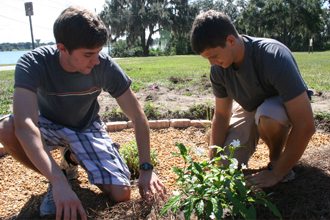Polk State Students Put Studies to Work, Planting Rain Gardens on Campus

Students Andy Wooddell (L) and Frank Portlock were among two-dozen students who recently planted two rain gardens on Polk State's Winter Haven campus.
Polk State College’s Winter Haven campus just got a little greener, thanks to students who recently finished planting two rain gardens on its eastern edge.
“It feels great that we actually did something,” said student and Dundee resident Amelia Ford. “We learned about a problem and then we got to do something that actually matters.”
Ford and about two-dozen other students who participated in the rain garden project are in Professor Natalie Whitcomb’s Introduction to Environmental Science course, which was developed four years ago to teach the connection between Winter Haven’s environment and the environment on a global level.
During the course, students meet with City of Winter Haven Natural Resources Division Director Mike Britt and Natural Resources Coordinator Mary Thornhill, as well as Anne Yasalonis, program coordinator for the Florida Yards & Neighborhoods program at the Polk County Extension, to learn about the Florida aquifer, the effects of urbanization on our natural environment, and Florida-friendly landscaping that can withstand the state’s weather conditions.
Students also learn about rain gardens, which contain native plants and help redirect water runoff into the ground, where it recharges the aquifer; the City of Winter Haven is increasingly creating rain gardens within its boundaries.
Last fall, inspired by what they learned, students in the class planted their first rain garden on the Winter Haven campus, on a lawn outside the Administration Building. With the two recently planted rain gardens, the project is now on its way to tradition status.
“We’re using social situations to start to build an awareness of local issues, and an awareness of the need to be scientifically literate,” Whitcomb said of the rain garden project.
Students in this fall’s class began their project by scouting locations on the Winter Haven campus. They soon settled on a sloping lawn just to the east of the College’s Winter Haven Fine Arts building.The students noticed that rainwater runs off a nearby parking lot and flows down the slope into Lake Elbert, taking oil and other contaminants with it. Rain gardens, as they had learned in class, would help stop that flow and redirect water into the ground, where it would be filtered by the soil before hitting the aquifer.
Just as it did last year, Davenport nursery The Natives donated many of the Florida-friendly plants used in the project, including blanket flower, palmettos and beautyberry.
With the site selected and plants on hand, the students got digging. They finished the gardens with rocks to help filter the water and topped off the gardens with a layer of pine straw.
The plants will have to be watered through the end of the year to get established. Because they’re Florida-friendly, they won’t need much upkeep after that, surviving periods of heat and cold, rain and drought all on their own — all while redirecting water into the ground.
As the students put the finishing touches on their gardens, they said the project has been a worthwhile one that they won’t soon forget.
“I’ve learned about the importance of water and that one person can do something,” said student and Haines City resident Andy Wooddell.

